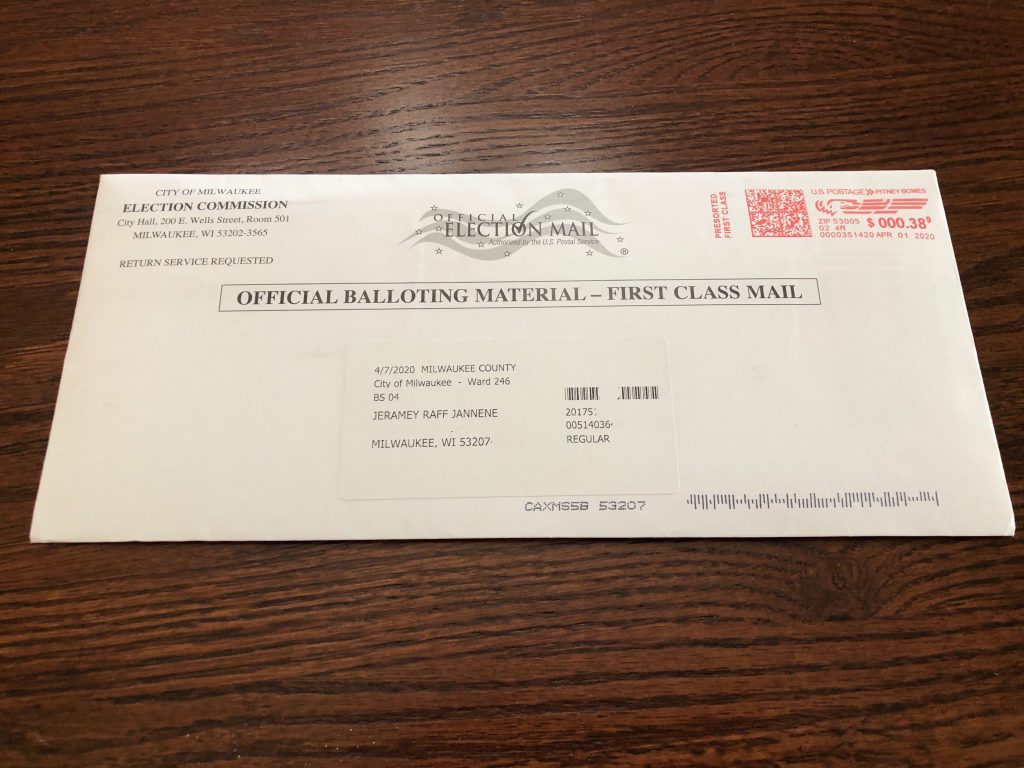US DOJ Backs State’s Disabled Voters
Federal attorneys intervene in lawsuit to protect absentee voter assistance for disabled voters.
The U.S. Department of Justice (DOJ) intervened on behalf of several Wisconsin voters with disabilities suing to protect their ability to receive assistance when returning an absentee ballot.
In a statement of interest submitted on Thursday to the federal court hearing the case, the DOJ said that no matter what state law says, voters with disabilities must be allowed to have assistance because of provisions in the Voting Rights Act and the Americans with Disabilities Act.
The progressive legal organization Law Forward filed the lawsuit against the Wisconsin Elections Commission in late July on behalf of four voters with disabilities following a decision from the Wisconsin Supreme Court, which prohibited the use of absentee ballot drop boxes and left unsettled questions over the issue of absentee ballot assistance — which could include having another person return a ballot on behalf of a disabled voter. Following the decision, Wisconsin Elections Commission Administrator Meagan Wolfe said in a news conference that state law requires individual voters to return their own ballots.
For the four voters who brought the lawsuit and many other voters with disabilities, returning their own ballots can be an insurmountable challenge. For example, some voters have trouble leaving their homes or don’t have the use of their arms to physically place the ballot in a mailbox. For many disabled voters, absentee voting is their only option so if they’re unable to get assistance returning their ballots, they’ve effectively been prevented from casting their votes.
In response to the federal lawsuit, the Wisconsin Department of Justice, which is representing the WEC, said that it agrees with the voters that federal law protects absentee ballot return assistance and therefore there isn’t a controversy so the case should be dismissed.
Law Forward litigation director and Stafford Rosenbaum attorney Doug Poland says that this isn’t enough because the WEC hasn’t officially stated it will administer upcoming elections while protecting this right.
Because the state DOJ was “noncommittal” in its statements about protecting the voting rights of disabled voters, Poland says he thinks the U.S. DOJ took the “very unusual” step of intervening in order to protect the voting rights of disabled voters in Wisconsin.
“It’s very unusual and very noteworthy,” he says. “I think it’s very noteworthy because the reason I think they probably did it is the Wisconsin Department of Justice is giving no indication that it’s going to enforce the voting rights these people have. We have no comprehensive, definitive statement by the Wisconsin Elections Commission, no statement by the chief election official and the Wisconsin DOJ is asking that our case be dismissed. Without the elections commission and without Wisconsin DOJ looking out for people, that’s why I think U.S. DOJ said somebody with law enforcement oversight has to step in and make it clear what federal law is.”
“Accordingly, all voters — whether they choose to vote absentee or not — who require assistance due to disability are entitled to Section 208’s protection, and ‘a state cannot restrict this federally guaranteed right’ by ‘defining terms [such as ‘vote’] more restrictively than as federally defined,’” DOJ wrote. “Any distinction that state law may make between in-person voting and absentee voting, see, e.g., Wis. Stat. § 6.84 (‘[V]oting by absentee ballot is a privilege exercised wholly outside the traditional safeguards of the polling place’), therefore is irrelevant to the conclusion that Section 208’s federally guaranteed right applies to absentee voters.”
DOJ also wrote that a provision in state law which requires municipal clerks to “make reasonable efforts to comply with requests for voting accommodations made by individuals with disabilities whenever feasible,” isn’t enough. DOJ argues that this leaves voting access up to the subjective decisions of clerks over what counts as “reasonable” and “feasible” when the protections of the VRA are much broader.
“In other words, state law merely requires local election officials to consider granting reasonable accommodation requests from voters with disabilities, based on those local officials’ subjective sense of reasonableness and feasibility,” the agency wrote. “Relying on such a discretionary, permission-based scheme unlawfully narrows the scope of Section 208’s right to assistance, which is an affirmative right to any necessary assistance that does not hinge on the vagaries of local election officials’ discretion and judgment.”
Poland says this is the first time in 12 years of bringing elections related lawsuits in Wisconsin that he has seen the U.S. DOJ intervene, a step that he is “very grateful” the federal government is taking in this case.
U.S. DOJ intervenes on behalf of disabled voters in lawsuit to protect absentee ballot assistance was originally published by the Wisconsin Examiner.






















